Identification
- Country of Origin: Philippines.
- Years Lived in America: 3 years (migrated to the U.S. with parents after finishing high school).
- Extent of Education: Finished high school under the 4 year program in the Philippines.
- Age when completed: Graduated when they were 18 years old.
The name of the research subject is Josh Del Rosario who legally migrated to the U.S. from the Philippines 3 years ago after he finished his high school degree in the country. Due to differences in academic requirements between the U.S. and the Philippines, Josh is currently taking up various placement exams in order to showcase that the education he received is sufficient enough to enter into the collegiate system within the country.
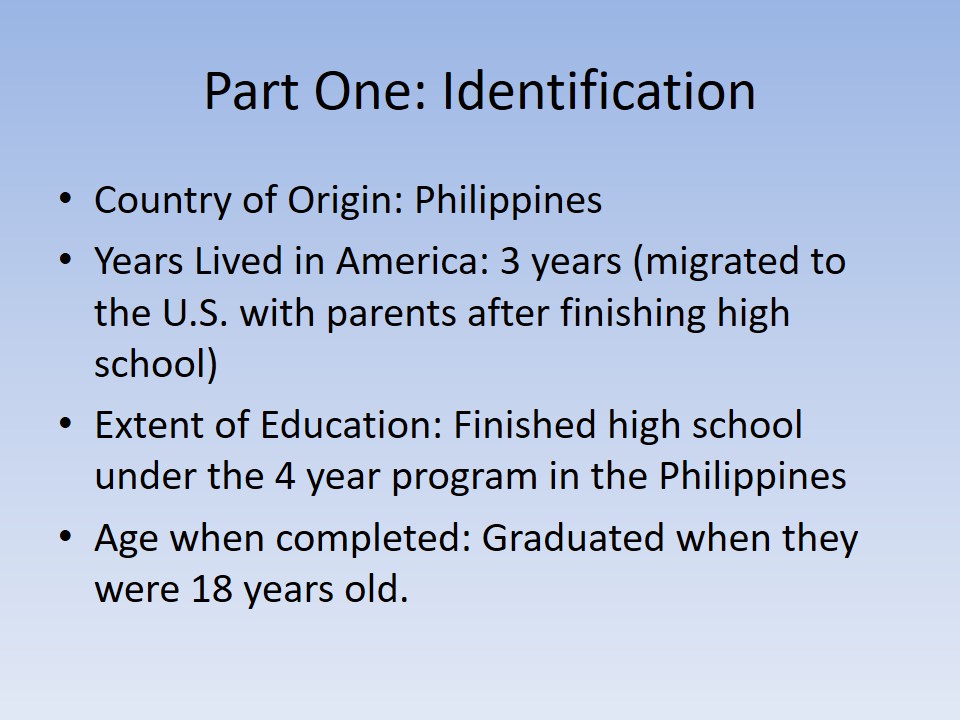
Incivility
- Significant use of “honorifics” when used to address teachers or other school staff.
- Example of honorifics: “po” “opo” added to the end of sentences to denote respect.
- Non-usage of honorifics when addressing a teacher was considered very rude and disrespectful.
- Disrespectful speech was not tolerated.
- Informal speech was not utilized within the context of teacher-student communication.
- Students were expected to be respectful to the teacher at all times.
- Correcting or talking back to the teacher was not allowed.
Within the context of teacher-student relationships in the Philippines, students were expected to utilize “honorifics” at the end of some of their sentences when it came to answering or talking to a teacher. The phrase “po” is meant as a means of acknowledging the age and experience of the person being addressed while “opo” was meant to denote respectful agreement to whatever the teacher was asking (ex: Yes, sir). The usage of these phrases were commonplace in teacher-student communication and showcases the importance of formality in communication within the Philippine system of education. Informal speech was not tolerated when it came to addressing teachers and students were constantly reminded that they need to follow everything that the teacher told them to do. Talking back to the teacher or even attempting to correct them was very rare and not encouraged based on the culture of education that was in place.
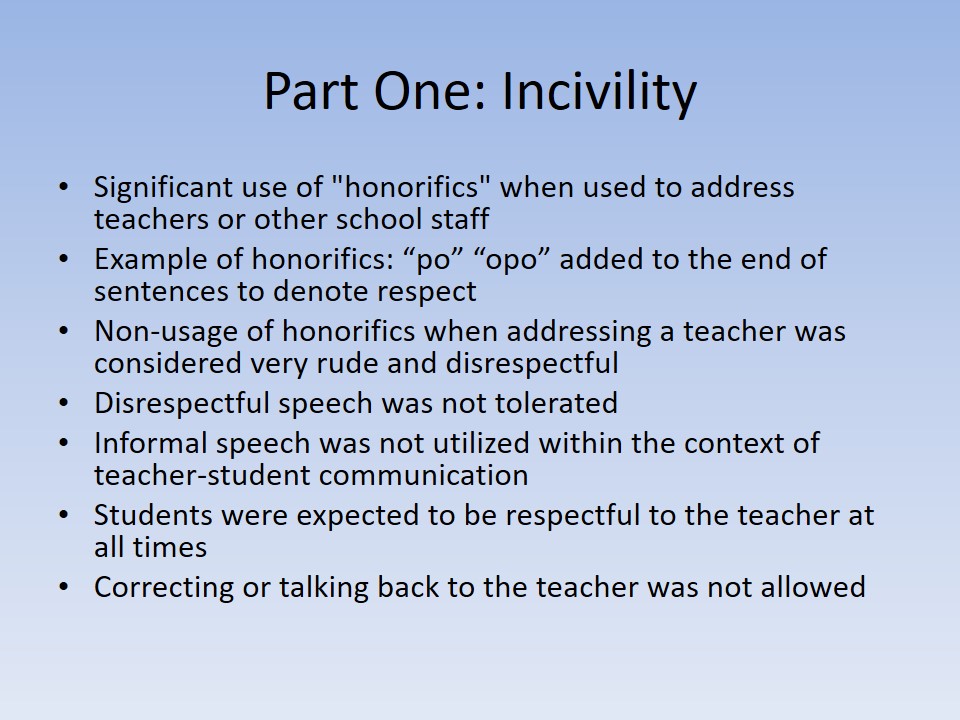
Expected roles of student and teacher
- Teacher acts primarily as a facilitator of information.
- Students are meant to learn from the teacher.
- Interactions beyond the aforementioned roles between student and teacher are rare.
- Teachers focus on teaching students and nothing more.
- Students are meant to respect teachers through the use of respectful speech.
- Teachers rarely guide students beyond what is required by the academic curriculum.
- Students do not interact with teachers outside of the school.
Based on the interview conducted, it was shown that the roles of teacher and students within the Philippine system of education were pretty straightforward in that teachers primarily focused on teaching and students focused on learning. There was little in the way of developing significant friendships or collaborations beyond the context of school work. One of the reasons behind this could be connected to the fact that with the emphasis the Filipino culture places on respect, there is a signficant “gap” so to speak between teachers and students which results in either side being hesitant to bridge it due to long standing cultural norms.
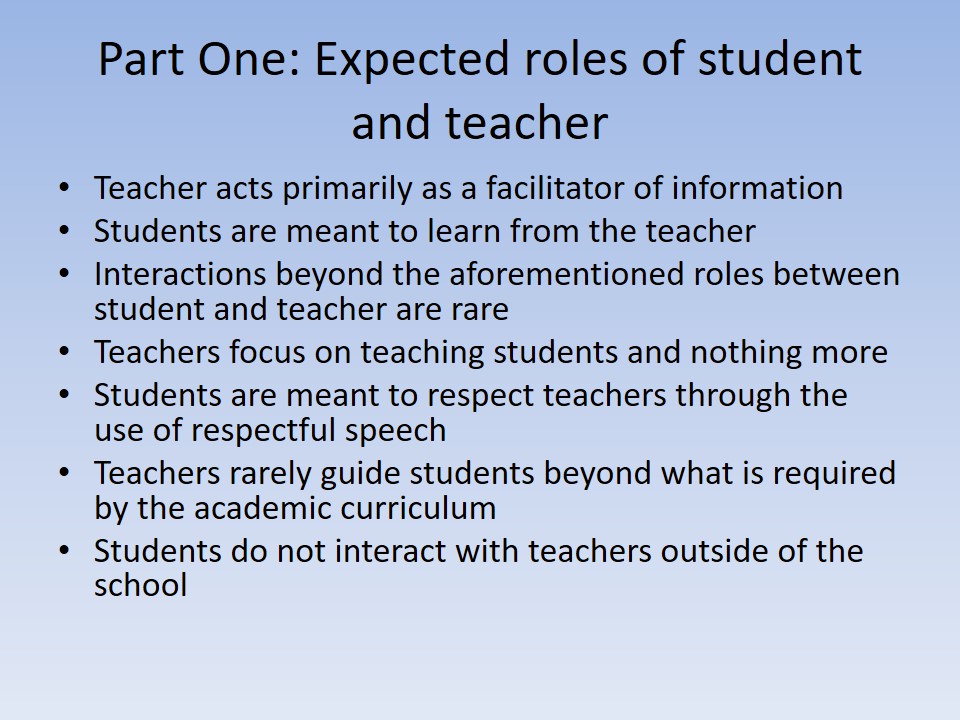
Academic Honesty
- Focuses primarily on major tests.
- Does not apply to small quizzes or exams that are not being monitored.
- Sanctions against students that are caught are relatively minor.
- Teachers are not strict enough when it comes to preventing cheating.
- Due to a lack of sufficient preventive measures, cheating among students occurs a lot.
- Teachers are aware of the problem but do little in the way of significant actions against it (Schulte & Choudaha, 2014).
- Teacher performance bonuses are based on student results.
While teachers within the Philippines are well aware of the concept of academic honesty, its application within their classroom can be during major exams only. Minor exams and quizzes are rarely “policed” so to speak when it comes to determining whether someone is cheating or not. While teacher are aware of the problem, there is also the fact that since their bonuses are dependent on the performance of students there is some “incentive” so to speak to allow the practice to continue so as to allow higher grades.
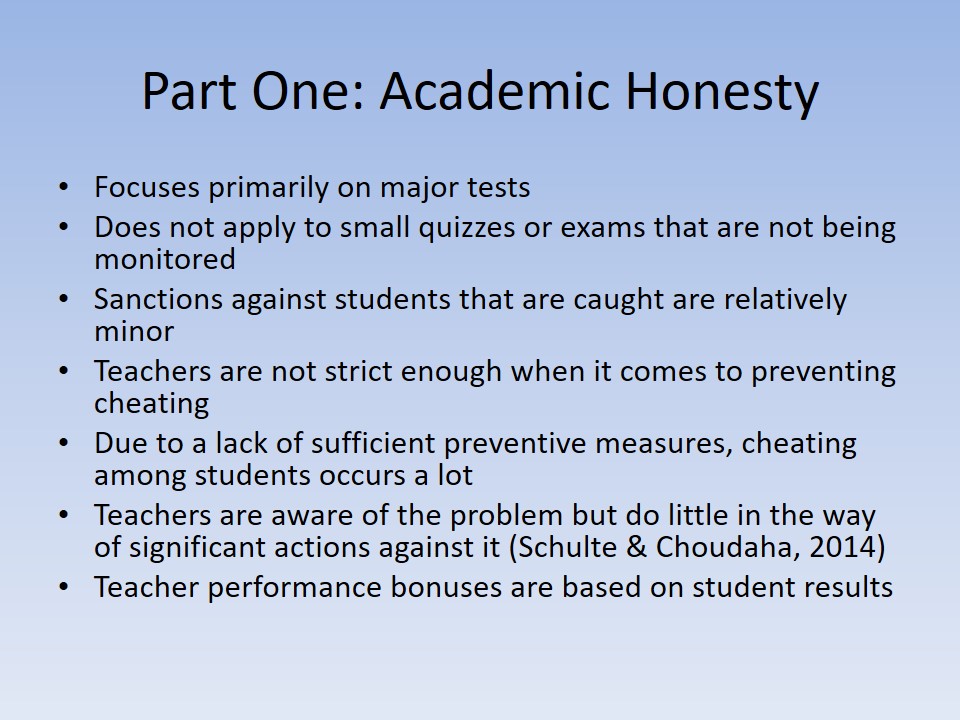
Plagiarism
- Concept is relatively unknown.
- Checks on plagiarism are not applied.
- Teachers do not discuss the problems with it in class.
- Students do in fact plagiarize a lot within classes.
- Teachers fail to catch it due to a lack of standing policies to police such actions.
- Problem is due to a lack of regional and national policies denouncing the process.
- Students believe it is “ok” since they do not get caught.
The concept of plagiarism is relatively unknown in the Philippines given a lack of sufficient national and regional policies from their department of educations that denounce it. As a result, there is little in the way of sufficient checks and balances on the part of schools and teachers to prevent a student from the Philippines from plagiarizing significant amounts of their work from the internet. Since there are few barriers against it, many students within the country plagiarize (at least those in the public school system).
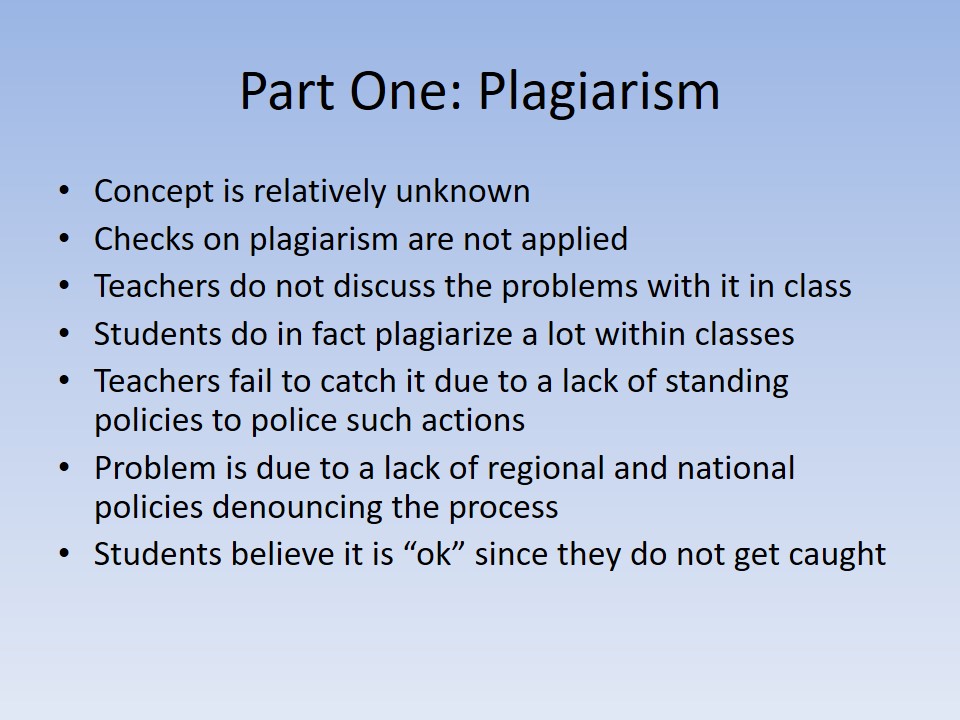
Contemporary Problem Solving
- Teachers merely present the information and expect students to solve the problems on their own.
- Teaching style concentrates more on rote learning methodologies.
- Students are expected to study on their own and learn how to solve problems based on the provided textbook.
- Due to the sheer amount of students per classroom (nearly 40), teachers are not able to devote as much time as they can to individual cases.
- Lack of individual attention creates issues with understanding lessons before progressing to the next level.
- Teachers do not on helping students understanding every aspect of the problem.
- Lack of sufficient flexibility when it came to the schedule of lessons.
When examining this issue, it becomes apparent that rote learning methods are more common within the Philippines as compared to the U.S. This may be due to the sheer size of many classrooms with teachers having to deal with 40 students at any one time.
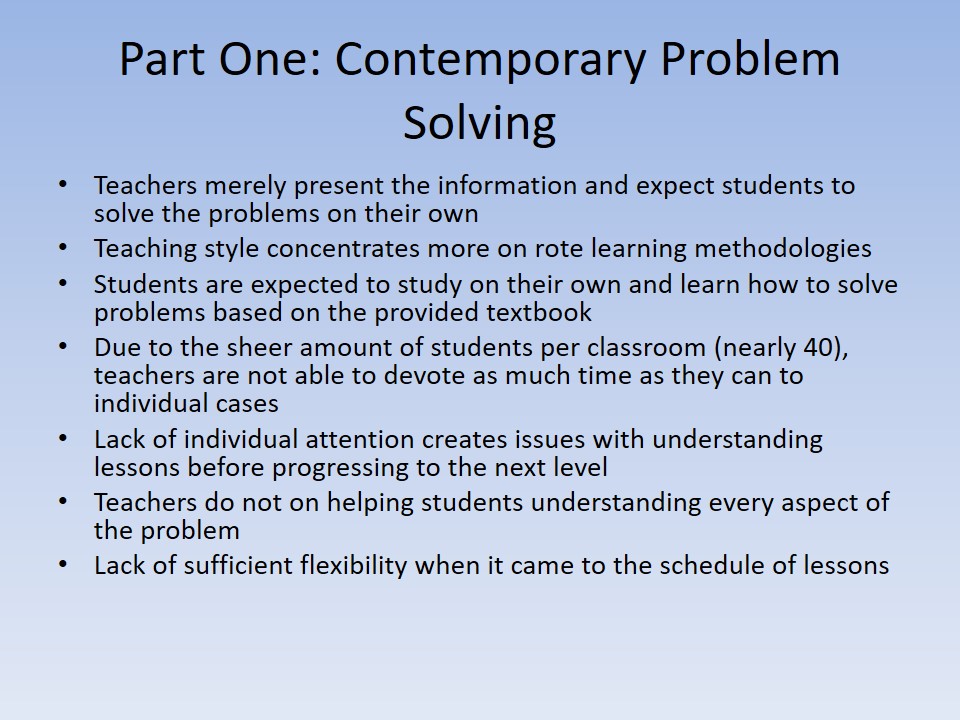
Plagiarism as Compared to the U.S.
- Current university policy surrounding involving plagiarism is strict to the point that someone caught plagiarizing another individual’s work could potentially be suspended or ejected from the University (Miao & Wildemeersch, 2008).
- This policy differs significantly from what someone from the Philippines is used to.
- Necessity of informing the individual regarding present day university policy.
- Teach them what is and what is not plagiarism.
- Enable them to develop an understanding regarding the severity of the issue.
- Helping them put proper citation into practice.
- Focus on preventing instances of potential plagiarism in the future.
One of the main differences between the state of education in the Philippine and within the U.S. is the fact that plagiarism is treated far more severely here. As a result, the person that was interviewed may utilize the same practice they did in the Philippines and find themselves summarily kicked out of the university. It is based on this that they would need to be taught about the university’s policy on plagiarism and what they have to do to follow it.
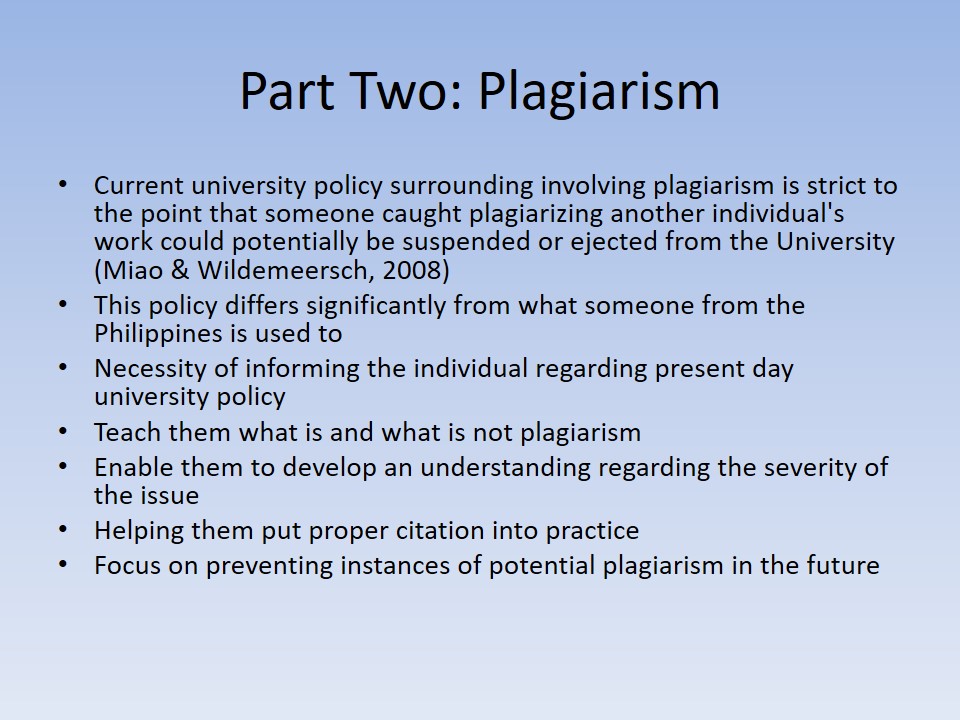
Incivility as Compared to the U.S.
- There is a great deal of overlap between university policy involving proper respect for teachers in the U.S. and those in the Philippines.
- One difference is that it is not necessary to constantly use honorifics.
- Inform the interviewee that informal language is common between teacher-student communication.
- Inform them of the proper way in which informal talks can be applied.
- Apply examples as to when formal and informal language is to be utilize (Menzies & Baron, 2014).
- Encourage the interviewee to talk more informally to teachers.
- Inform them that the use of informal language is a commonplace when it comes to developing a rapport with professors (Chang, Bai, & Wang, 2014).
Since the person that was interviewed was used to overly formal speech in addressing teachers and is unused to developing a rapport with professors, it would be necessary to help them understand how it is actually normal to speak informally to professors so long as it is done properly. This can be done by providing examples and showing the proper types of formal and informal speech.
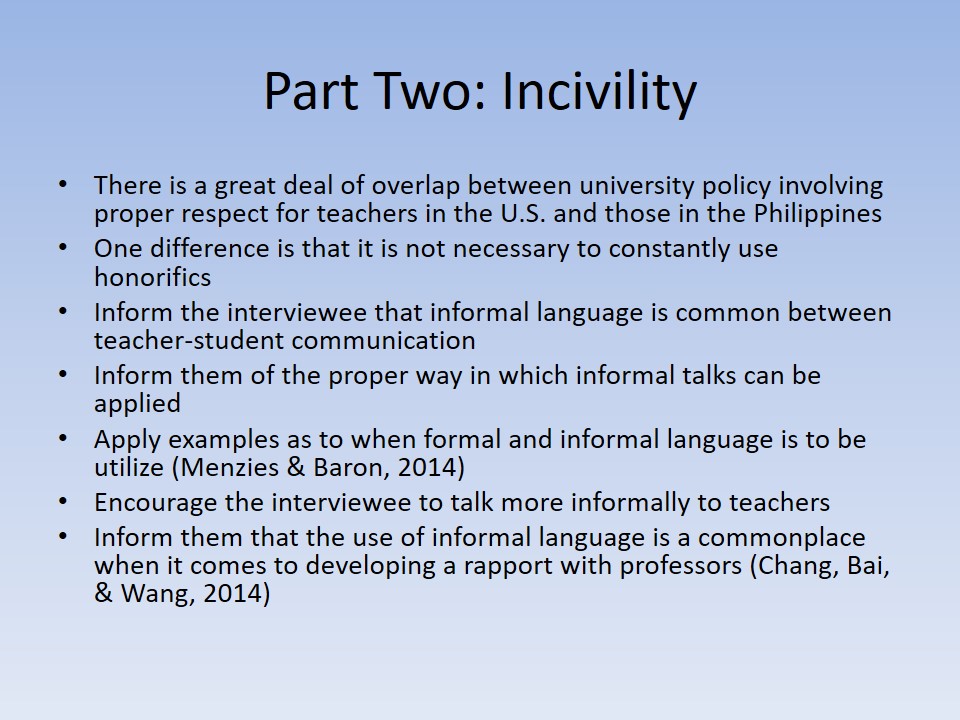
Academic Dishonesty
- University punishments for academic dishonesty are very severe ranging from suspension to expulsion from the university.
- The interviewee from the Philippines is unaware of the severity.
- Inform them of the consequences of violating university policy regarding the issue.
- Instill into them the fact that even minor violations can have major consequences if caught.
- Inform them of what is and what is not considered as academic dishonesty.
- State that the university culture is far different from that of the Philippines and, as such, his classmates are not likely to help him cheat.
- Focus on establishing ground rules regarding proper adherence to university policies surrounding academic ethics (Liu & Winder, 2014).
With punishments being significantly different when it comes to the different systems of education within the Philippines and the U.S., it would be necessary to teach the interviewee that even minor infractions involving academic dishonesty can have major consequences. This can be done through the use of examples and a general review involving present day university policies.
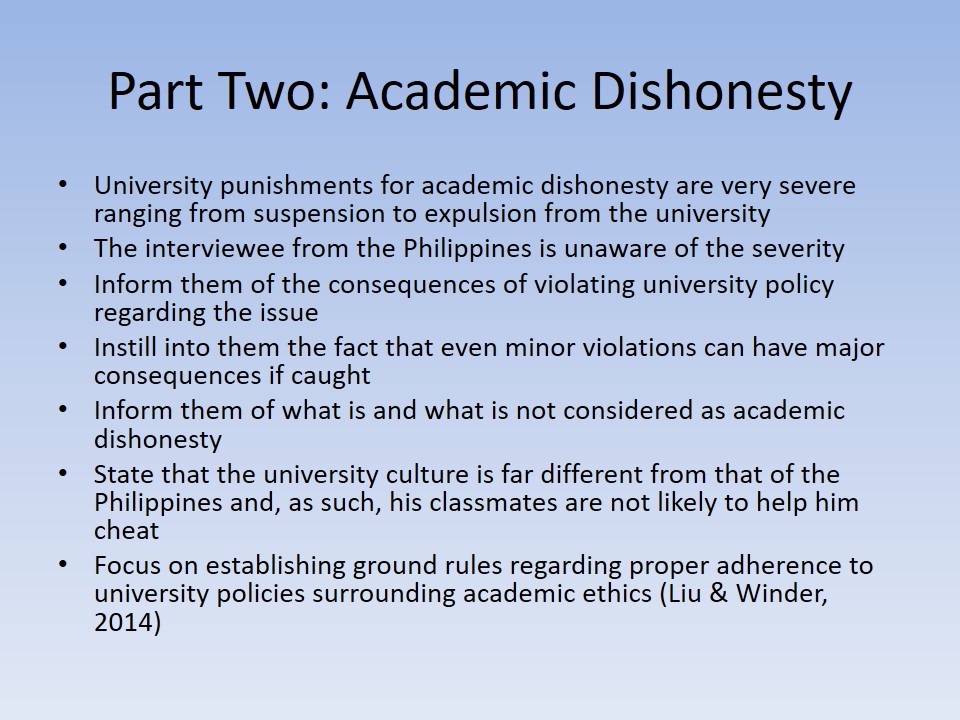
Expected roles of student and teacher as Compared to the U.S.
- The university encourages students to talk to professors and ask for guidance.
- Due to his experience in the Philippines, the interviewee is unaware that this is actually a common practice.
- Inform them of the advantages of talking to a professor and asking for help.
- Inform them that this is a common practice that they should utilize.
- Focus on helping them understand the necessity of developing a good student-teacher relationship.
- Help them to understand how to approach professors.
- Provide personal feedback on how the process helped in your own experience.
Lastly, it is important to teach the interviewee that developing proper rapport between students and professors is absolutely essential in order to get assistance and understand the lesson better.
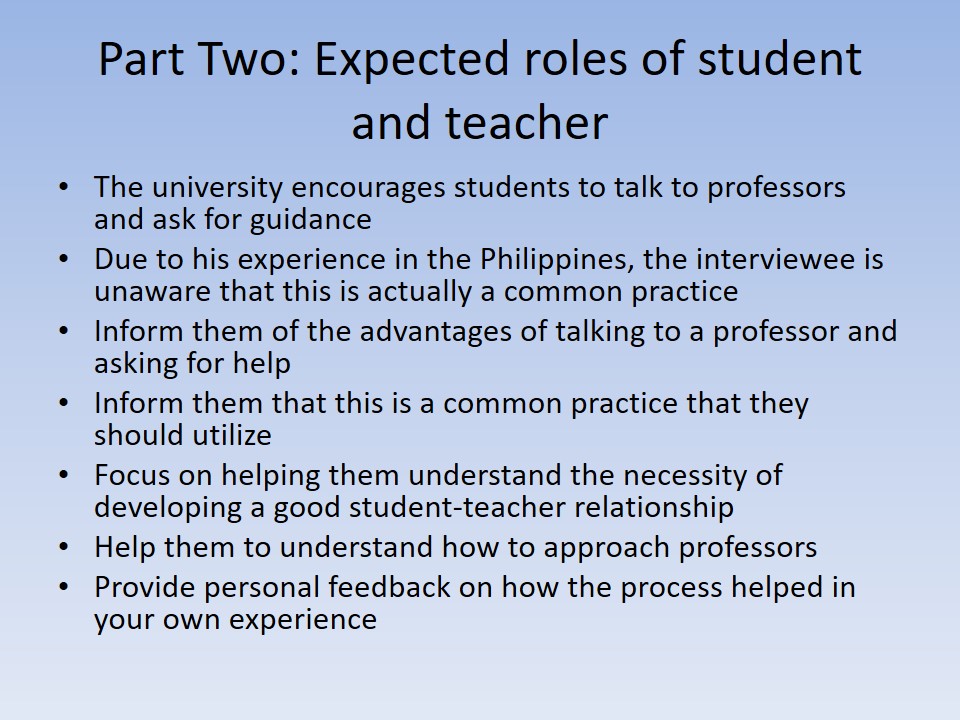
Reference List
Chang, T., Bai, Y., & Wang, T. (2014). Students’ classroom experience in foreign-faculty and local-faculty classes in public and private universities in Taiwan. Higher Education, 68(2), 207-226.
Liu, D. Y., & Winder, B. (2014). Exploring foreign undergraduate students’ experiences of university. International Journal Of Qualitative Studies In Education (QSE), 27(1), 42-64.
Menzies, J., & Baron, R. (2014). International postgraduate student transition experiences: the importance of student societies and friends. Innovations In Education & Teaching International, 51(1), 84-94.
Miao, Z., & Wildemeersch, D. (2008). Hosting Foreign Students in European Universities. European Education, 40(1), 51-62.
Schulte, S., & Choudaha, R. (2014). Improving the Experiences of International Students. Change, 46(6), 52.